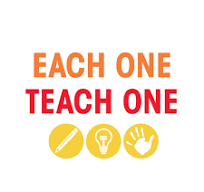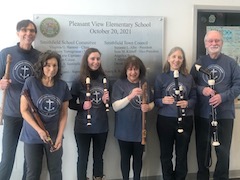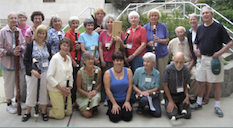"Each One Teach One" - Applying this Concept to Chapters

“Each One Teach One” is an African-American proverb that has been recycled through a wide array of contexts over the years, from political party slogans in Great Britain to literacy campaigns in the Philippines to Reggae culture in Jamaica. At its core, it recognizes that fact that everyone has something positive to contribute to a community, and that this simple truth is a profound source of dignity.
As a professional Teaching Artist for many years, I knew and employed this concept instinctively. But it wasn’t until I became familiar with the Venezuelan-born youth development program known as El Sistema, that I saw it embraced as the very core of what became the 20th century’s greatest contribution to music pedagogy.
Now widely admired and replicated the world over, El Sistema uses ensemble music to enable every child to experience being an asset within her or his community. El Sistema’s unapologetic goal is to develop responsible, joyful, contributing citizens, with beautiful music as the by-product. To quote my good friend Eric Booth (El Sistema expert and author of The Music Teaching Artist’s Bible), "Students […] take on teaching roles themselves starting at an early age—peer-to-peer instruction is omnipresent as a practice, as a habit of mind, both in designated mentoring roles and in the constant impulse to help others improve their level of musical excellence. El Sistema-inspired programs nurture peer-responsibility and peer-instruction in every way they can. This work is not effortful nor discipline-driven; it is the serious play of an artist in 'flow experience,' which research affirms is optimum engagement in any endeavor, and which leads to optimum performance and learning."

As both a chapter leader and co-chair of the ARS Diversity, Equity, and Inclusion committee, I have recently found myself wondering if this “optimum engagement” tool could be put to good use in the cause of creating more welcoming spaces among ARS chapters, and if such an approach could also generate an increased sense of belonging among members both old and new.
Earlier in my career, I spent many rewarding years as a director of children’s choirs, orchestras, and ensembles. If there is one oft-repeated refrain of mine that I hope young musicians I’ve worked with remember, it is this: “Every morning, when you wake up, you have the opportunity to make the world a more beautiful place, with even just one note. So make the most of it.” I sincerely believe that.
I also believe that, with this kind of thinking, everyone – child or adult - can learn to experience and express music deeply and, as a result, receive and share its many benefits. Effective learning at all ages is a process filled with joy, and one that provides consistently successful experiences within a high-functioning, aspiring, nurturing community. And if you know how to produce one more beautiful note than your stand partner, then that’s a golden opportunity for “Each One Teach One.”
So how can such a perspective and approach be applied at the chapter level? With some creative and deliberate thinking, I imagine that ARS members across the continent can find many ways.

The Long Island Recorder Society, for example, has a mentor system in place for regular playing sessions. This means that everyone who walks in the door is either a mentor or a mentee. Mentees look for someone with a little “mentor” sign on their music stand and sit next to them. Mentors help mentees to know where they are in the music, check fingerings, stay on time, and generally feel comfortable being a part of the group. Other ideas I’ve heard include structuring chapter meetings so that they begin at a time designated for newer attendees to go over the music and technique tips with a few veteran members before the entire group arrives; holding small meetings in a member’s home a few days ahead of time for folks who want a bit of extra preparation before the full playing session; and holding hybrid meetings so that inexperienced players who want to try playing the music at home, without the potential embarrassment of any cracks or squeaks, can do so. All of these ideas can be employed without the involvement of a formal session leader.
But these are just a few ideas. Do you have another that you’d like to share with your ARS peers?
Let us know what you’ve done in your community to build a sense of belonging for recorder enthusiasts of every skill level and background. Any healthy learning organization, which includes your local ARS chapter, is always becoming - striving towards greater inclusion, deeper impact, greater musical excellence, more joy. And stories of becoming are always exciting and inspiring. We’d love to share yours.
Submitted by ARS Board Member Jamie Allen, co-chair of the Diversity, Equity, and Inclusion Committee





 The Long Island Recorder Society, for example, has a mentor system in place for regular playing sessions. This means that everyone who walks in the door is either a mentor or a mentee. Mentees look for someone with a little “mentor” sign on their music stand and sit next to them. Mentors help mentees to know where they are in the music, check fingerings, stay on time, and generally feel comfortable being a part of the group. Other ideas I’ve heard include structuring chapter meetings so that they begin at a time designated for newer attendees to go over the music and technique tips with a few veteran members before the entire group arrives; holding small meetings in a member’s home a few days ahead of time for folks who want a bit of extra preparation before the full playing session; and holding hybrid meetings so that inexperienced players who want to try playing the music at home, without the potential embarrassment of any cracks or squeaks, can do so. All of these ideas can be employed without the involvement of a formal session leader.
The Long Island Recorder Society, for example, has a mentor system in place for regular playing sessions. This means that everyone who walks in the door is either a mentor or a mentee. Mentees look for someone with a little “mentor” sign on their music stand and sit next to them. Mentors help mentees to know where they are in the music, check fingerings, stay on time, and generally feel comfortable being a part of the group. Other ideas I’ve heard include structuring chapter meetings so that they begin at a time designated for newer attendees to go over the music and technique tips with a few veteran members before the entire group arrives; holding small meetings in a member’s home a few days ahead of time for folks who want a bit of extra preparation before the full playing session; and holding hybrid meetings so that inexperienced players who want to try playing the music at home, without the potential embarrassment of any cracks or squeaks, can do so. All of these ideas can be employed without the involvement of a formal session leader.